Iranian Hunger Striker Again Urges UK PM To Proscribe IRGC
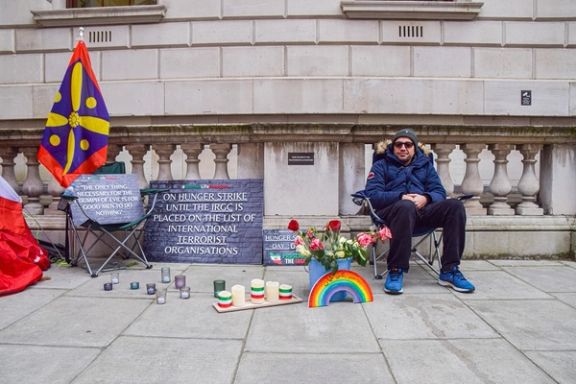
Iranian activist Vahid Beheshti, on a hunger strike in London since February 23, has once more called on Prime Minister Rishi Sunak to designate the IRGC as a terrorist organization.

Iranian activist Vahid Beheshti, on a hunger strike in London since February 23, has once more called on Prime Minister Rishi Sunak to designate the IRGC as a terrorist organization.
Beheshti has been battling the bitter winter outside the UK Foreign Office to raise awareness for the need to designate the IRGC responsible for the deaths of hundreds of Iranian citizens since September.
In his third and letter on Monday, he reiterated his desire to meet PM Sunak, adding that “Today marks my 40th day of hunger strike and as I have told the media in recent days, my body grows ever weaker, yet internally, I grow ever stronger in my conviction that this is the right thing to do.”
Beheshti called his request to the British government "simple and at the same time, very important" emphasizing the urgency of proscribing the IRGC.
He said the designation urgently needs to happen, not only for the people of Iran who yearn for democracy, but also for the people of Britain and "the values we uphold".
“As long as we continue with our appeasement policy, the IRGC will continue with their hostage taking policies,” he said. “They only understand one language, pressure and strong leadership.”
Beheshti has not eaten in 41 days and lost over 13kg or about 17% of his body mass. In the past days, a group of other Iranians also joined him and set up tents next to him.
The Telegraph reported in February that “Joe Biden’s diplomats are pressing the UK Government not to formally declare Iran’s Revolutionary Guard a terrorist group, despite the Home Office backing the move…” It added that the US is saying Britain should keep doors open in case of a need to be an interlocutor.
Many politicians in Europe have been urging the designation of the IRGC as a terror organization in the wake of bloody violence against protesters in Iran and other malign activities.
European Union officials, however, have delayed the move arguing that such a decision must be backed by a legal determination of a European court.
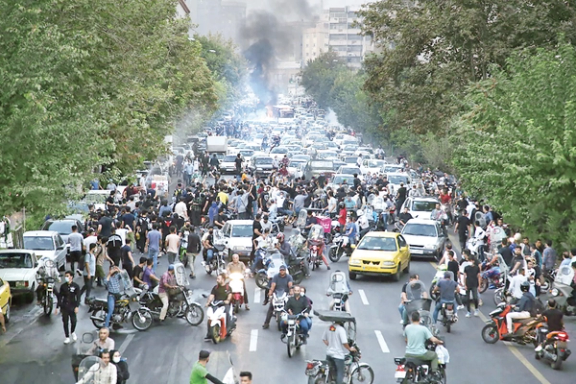
The UN Human Rights Council Tuesday adopted a resolution sharply criticizing the situation in Iran in the wake of a deadly crackdown on antigovernment protests.
The HRC voted to accept the Report on the human rights situation Iran from its Special Rapporteur Javaid Rehman and extended Rehman’s reporting mandate by another twelve months.
Rehman was pleased with the result of Tuesday’s vote in the Council. Talking to Iran International after the vote, Rehman said he welcomed the strong vote accepting his Report’s findings and recommendations and extending his mandate.
Rehman said that the vote, stronger this year than in some previous years, showed that the Council recognized that what he called the “alarming and concerning” human rights situation in Iran had become much worse since the death of Mahsa Gina Amini than in the previous reporting period.
The Islamic Republic has been criticized by the UN rights body and international organizations defending human rights for decades. In the latest round of protests, security forces killed more than 500 civilians and arrested at least 20,000 based on estimates presented in detail by monitoring groups.
The Resolution’s summarized Rehman’s original report and its recommendations. These deplored the “widespread, repeated and persistent” violation of human rights in the Islamic Republic and called on Iran to end its “systematic impunity” and hold human rights violators accountable in line with international law.

The Resolution also called for Iran to stop discrimination and violence based on gender and ethnicity and belief. The Resolution expressed its “deep concerns” at the surge of executions and called on Iran to honor its own agreed legal obligations under international law and to halt all executions for offences “that do not meet the threshold of the most serious crimes or for alleged offences committed before the age of 18 years.”
Twenty-three countries, mostly in Europe, voted in favor of the Resolution; eight against, among which were China, Pakistan and Cuba. China justified its No vote on the grounds that it was always opposed to any interference in the internal affairs of states. Pakistan said the Resolution was politically driven and human rights investigations were “best done with the consent of their country concerned”.
This last point would make the Special Rapporteurs job redundant, since Iran has refused both to recognize or acknowledge the mandate given by the UN to the HRC’s Special Rapporteur. Eritrea, Kazakhstan , Vietnam, Bolivia and Bangladesh made up the refuseniks.
India and Qatar were among the 16 abstaining voters, which could both sit on their hands and yet let the Resolution pass. The abstainers included a bloc of sub-Saharan African states. Of these, South Africa said it recognized the part played by women in its own struggles for freedom and encouraged Iran to enhance its cooperation with the UN High Commission for Human Rights. But despite its concerns with what it called the ‘geo-politics’ of the Resolution, South Africa nevertheless did nothing to block the Resolution. Nor did India, which last time voted against the Special Rapporteur’s mandate being extended.
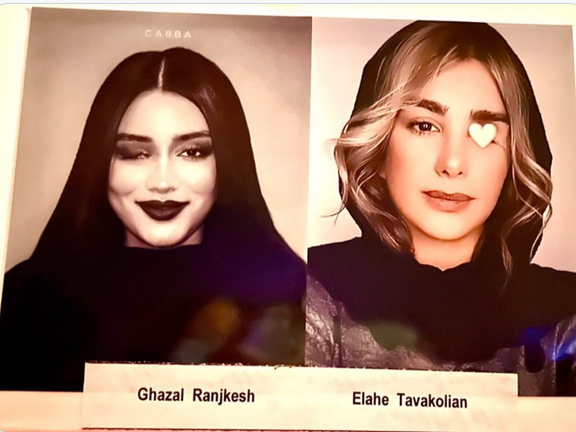
The Resolution, as with previous such resolutions, again “regretted” the refusal of Iran to allow Rehman into the country and called on Iran to cooperate with the Special Rapporteur and provide all information necessary “to allow the fulfilment of his mandate” … This last is what the UN calls its “standing invitation” to Iran to cooperate.
Iran’s UN ambassador Ali Bahreini was having none of it. Speaking in English shortly before today’s vote, Bahreini called the Resolution a “malign attempt” to “name and shame” the Islamic Republic. Bahreini said that the “weaponization of human rights as a foreign policy tool” was unacceptable and “endangers the common cause on human rights”.
The purpose of the Resolution, Bahreini claimed, was to “divert attentions from the violations of the rights of Iranians and crimes against humanity committed by the sponsors of this resolution through imposing nationwide unilateral coercive measures against Iran.”
This referred to sanctions imposed on Iran, a point raised in Rehman’s report which recognized the effects of sanctions on Iran’s health sector and called for exemptions in some areas. But, as Rehman argued in the Council, sanctions “should not be used to excuse violations of human rights”.
Iran has claimed that US economic sanction impede healthcare for its citizens, but in fact medicine is exempt and Iran has been importing annually around $3 billion dollars of medications and claims it is an exporter.
The Resolution voted through the funds for the Special Rapporteur’s mandate for a further year: at just under $500,000 for a twelve-month period covering all expenses, the post is not extravagant. Rehman now has to prepare a new Report by end of summer to be presented at the forthcoming UNGA in October.
The Resolution also calls for Rehman to work with the international independent fact-finding mission (FFM) on Iran, which itself is likely to prove another unwelcome pressure point on Tehran as it prepares its own report on alleged human rights violations there since the death of Gina Mahsa Amini on September 16, 2022. The FFM is due to present an oral update on its work to the Human Rights Council in June this year ahead of its comprehensive report to the HRC in March 2024.
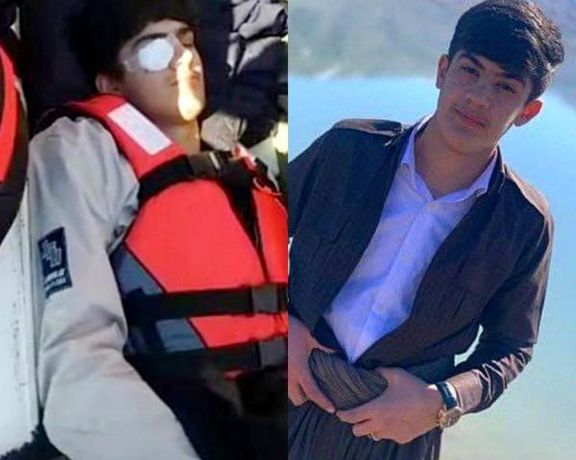
Iranians launched a Twitter storm on Monday in support of Zanyar Tondro, an 18-year-old man who was has lost an eye in the anti-regime protests.
Zanyar, along with his father, left Iran for treatment in Europe in the past weeks, but after their boat capsized, he was arrested by the Turkish police and taken to a refugee camp in the southwestern city of Mugla.
Social media users tweeted the hashtags #ZanyarTondro in Farsi and English asking for his treatment.
Informed sources have described Zanyar's condition as "unsuitable" to stay in Turkey due to lack of access to treatment and medicine.
On March 25, Kurdistan Press Agency published pictures of Zaniar who was on the way to Europe on a boat of refugees in Greek waters.
During the protests following the death in custody of Mahsa Amini, Zanyar lost his right eye when he was shot by regime forces. Reports say there are still 11 birdshots left in Zanyar's head, which have endangered his left eye as well.
A large number of protesters have been shot in the face and have lost one or both eyes during the protests that are still underway after more than six months.
The Oslo-based Iran Human Rights Organization says the shootings in the face and eyes were "systematic", but the Iranian officials have denied it.
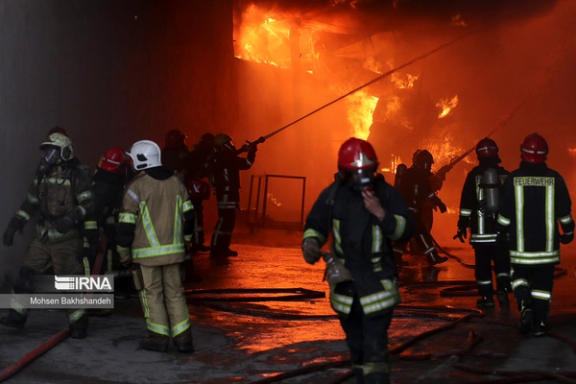
Media in Iran reported Tuesday that a large fire broke out at three warehouses of a home appliances manufacturer in the northeastern city of Mashhad.
The semi-official ISNA news agency reported midday local time that the warehouses belonged to Electrosteel, a large and well-known company in Iran.
"There are currently 100 firefighters at the scene. Due to the extent of the fire and thickness of the smoke, there is no information regarding potential victims," added ISNA.
60 fire trucks and water tankers arrived at the site to prevent the fire from spreading to the nearby warehouses and the gas tank of the factory.
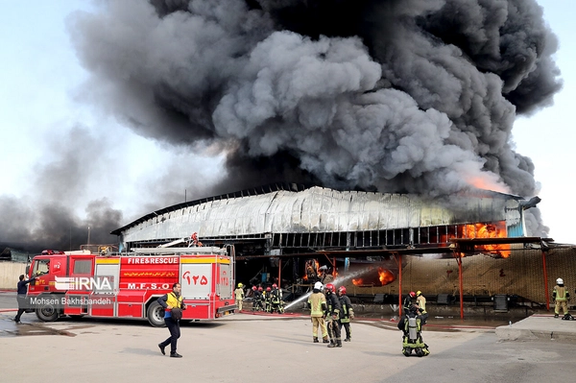
According to fire department officials, the warehouses occupy an area of approximately 2,000 square meters and part of them were destroyed due to the large volume of the blaze.
The official cause of the blaze has not been announced yet.

There have been a number of explosions and fires near Iran’s military, nuclear and industrial facilities in recent years.
On January 28, a huge fire erupted at an Iranian military industry factory following a suspected drone strike in the central city of Esfahan.
Iran blamed Israel for the drone attack vowing revenge.
On the same day, another large blaze also engulfed an industrial area near the city of Tabriz, northwest Iran. The government said the fire started at a refinery producing motor oil.

Amnesty International has urged Iran’s Chief Justice to revoke the "unjust conviction" of Jamshid Sharmahd, an opponent of the Islamic Republic, and to revoke his death sentence.
In a letter on Monday to Gholamhossein Mohseni Ejei, Amnesty said German-Iranian political dissident, Sharmahd, is at risk of execution after being sentenced to death for “corruption on earth” following a grossly unfair trial.
It goes on to say that since July 2020, the Iranian authorities have been subjecting him to enforced disappearance, torture and other ill-treatment including through prolonged solitary confinement and denial of adequate healthcare.
The international rights group also urged Ejei to reveal Sharmahd’s “fate and whereabouts and, in light of his arbitrary detention, immediately release him.”
Amnesty further asked the authorities that if they do not intend to release him, at least ensure that he is given regular access to family, adequate medical care, including dental care, a lawyer of his choosing and consular assistance from the German authorities.
Sharmahd, the director of Tondar opposition group, has been held in solitary confinement for hundreds of days, and during this time, he has been denied an independent attorney and fair legal procedures.
The news of his kidnapping in Dubai and his transfer to Tehran by Islamic Republic agents was first released in August 2020. The Islamic Republic has alleged that Sharmahd was involved in a 2008 bombing on a mosque in Shiraz that killed 14 people and wounded 200 more, something he and his family vehemently deny.

Israel conducted its tenth attack this year on suspected Iranian positions in Syria in the Damascus airport area and the fourth attack in less than a week.
The attack came at 12:15 am local time and Syrian air defenses fired missiles and reportedly stopped two incoming projectiles. Syria said two civilians were killed, but neither Damascus nor Tehran announce the true number of military casualties in these attacks.
The Syrian government also said that the attack was launched from the direction of the Golan Heights.
The Syrian Observatory for Human Rights, a London-based war monitor said that explosions were heard in the areas of Qasiyon Mountain and Al-Saida Zainab area, and ambulances rushed to these areas.
Israel has been regularly attacking targets in Syria since 2017 to weaken Iran's attempts to strengthen its military presence in the war-torn country and build up a threat on Israel's northern borders.
Government-controlled media in Iran simply carried what the Syrian government had reported, without further comments. Military figures usually refer to such attacks with a delay.
Israel’s first attack in five days came on March 30, followed by another strike on March 31. Iran admitted that two IRGC “military advisors were martyred” in those attacks and vowed revenge. Some observers commented that announcing the death of two officers meant that Tehran wanted to lay the ground for retaliation.
After a third Israeli attack early Sunday, an unidentified aircraft that was trying to penetrate the Israeli air space was shot down, but it remains unclear what type of aircraft it was or whether it was Iranian. Israeli media quoted a military source as saying that apparently Iran was behind the launch of a drone, but so far the government has not officially blamed Iran.
Iran has considerable drone capabilities that it has used against US bases in Syria as recently as last month, killing a US contractor and injuring at least eight US servicemen.
Tensions rose in Syria when on March 23 Iranian backed forces attacked a US base with a drone, inflicting casualties. The US responded with an air strike, which was followed by more attacks on US forces. The tit-for-tat strikes stopped after two days, but Iran has targeted US forces in Iraq and Syria 80 times since early 2021 when the Biden administration assumed office.
Israeli Defense Minister Yoav Gallant warned Iran in the context of agitating Palestinians to conduct more attacks. "We will not allow the Iranians and Hezbollah to harm us. We have not allowed it in the past, we won’t allow it now, or anytime in the future," Gallant said during the visit to an army brigade in the West Bank on Sunday.
"All our fronts are tense. The Iranians are extending their outreach to (the West Bank) and Gaza and are attempting to entrench themselves in Syria and Lebanon," said Gallant.